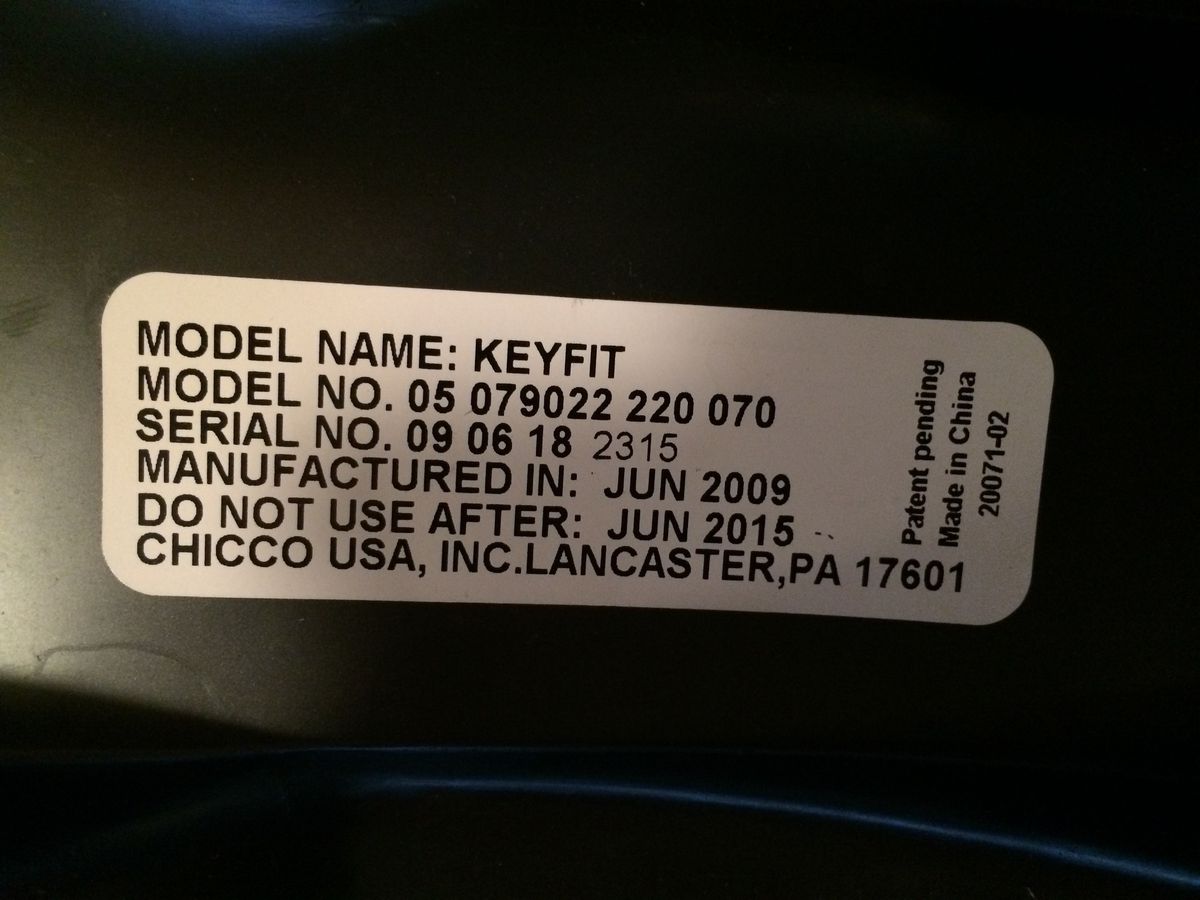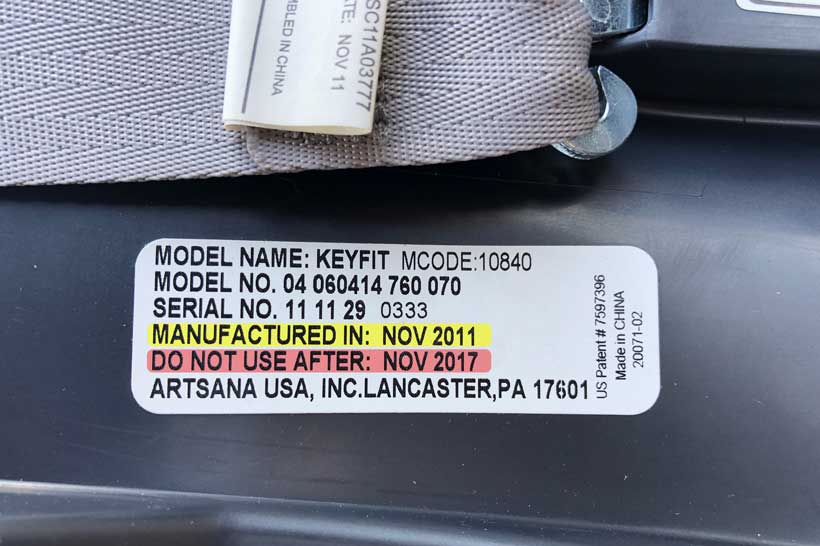
In this day and age, few parents would put their baby or small child in a vehicle without strapping them into a car seat. First of all, people know that their children are safer in car seats, but it's also illegal in all 50 states in the U.S. to transport children without one.
What many otherwise careful parents don't know is that car seats, like many products, have an expiration date. In this article, we will focus on answering the question "When do Chicco car seats expire?" and help you to fully understand why car seats expire, everything about Chicco car seat expiry, what to do with an expired seat.
What Do Car Seat Expiration Dates Mean?
Most people wouldn't feed their children expired food, but many parents are unknowingly transporting their children in car seats that are expired and no longer meet safety standards. But what exactly does it mean for a car seat to expire?
Car seat expiration dates estimate the number of years that your purchased car seat will fully protect your child in case of an accident. After a certain period of time, factors such as technological advancements and deterioration make the car seat less effective.
Keep in mind that just because a car seat expires doesn't mean that it becomes immediately useless after the expiration date. In fact, you're not breaking the law if you keep using a car seat after it expires.
Moreover, companies that manufacture car seats aren't even required by law to include an expiration date on their product or packaging. Nevertheless, most companies do include the manufacture date so that they can guarantee their car seat's safety for a specific period of time.
How Long Are Car Seats Effective?
Typically, most car seats are good for between six and 10 years after the date of manufacture. It's important to check this manufacture date when you're buying a car seat to make sure that it can serve you for as long as possible.
Why Do Car Seats Expire?
Although some people theorize that car seat manufacturers emphasize expiration dates on car seats so that they can simply sell more of their product, this is a myth. Car seats genuinely do expire and there are some valid reasons for that.
Recalls
It's not uncommon for companies to recall their products, and that includes car seats. When you buy your car seat, be sure to register it with the manufacturer so that you can be updated when there is news about the product you bought.
When recalls happen, it's usually because the car seat has been found to be faulty in testing. Although the faults can sometimes be fixed, if they can't be fixed, the manufacturer will let users know that it's not safe to use. Also, they will discontinue the production of that particular model.
Discontinuation
In many cases, standards for car seats change, and this deems previous models as unfit for continued use. Furthermore, it can be challenging to find replacement parts if you're using a discontinued car seat.
Deterioration
Everything breaks down over time, and the fact is that car seats usually get heavy use. They remain in vehicles for long periods of time and are exposed to varying weather conditions.
Heat, humidity, and cold have an effect on car seats and take a toll on the materials the car seat is made of. Plastic is particularly affected by extreme cold or heat, and the contraction and expansion that occurs will eventually affect the car seat negatively. Once the plastic in your car seat looks faded or has dents and cracks, it's time for a new car seat.
Another issue is that when the metal frames of car seats begin to rust, their safety during a collision is reduced. Crash tests in Sweden supported this finding, and testing showed that a rusty body and chassis can increase the likelihood of death by a startling 20%.
Regardless of how much you try to take care of your car seats, the fact is that regular wear and tear from frequent use also causes your car seats to deteriorate.
Technological Advancements
Much as you would not expect your phone from 10 years ago to still be as effective as modern phones, the same goes for your child's car seat. New features are added constantly and car seats produced several years ago can not compete with the features on newer models.
Newer car seats will have enhancements that testing has proven to save lives. For example, crash tests are frequently conducted to ensure that a child's survival rate during accidents is increased. Each new production of car seats improves the safety of the children who will be riding in them.
Chicco Expiration Dates and Where to Find Expiration Date on Chicco Car Seats
In the tables below, we have listed the expiration dates of the different Chicco car seat models.
Chico Infant Car Seat Expiration Dates with Owner Manuals
model | expiration date | expiration date location | manual |
|---|---|---|---|
6 years after manufacture date | Label on infant seat bottom | ||
KeyFit 35 Infant Car Seat | 6 years after manufacture date | Label on infant seat bottom | |
6 years after manufacture date | Label on infant seat bottom |
Chicco Convertible Car Seat Expiration Dates
model | expiration date | expiration date location | manual |
|---|---|---|---|
NextFit iX Zip Convertible Car Seat | 8 years after manufacture date | Label on car seat bottom | |
NextFit Sport Convertible Car Seat | 8 years after manufacture date | Label on car seat bottom | |
8 years after manufacture date | Label on car seat bottom | ||
NextFit iX Zip Air+ Convertible Car Seat | 8 years after manufacture date | Label on car seat bottom | |
NextFit Zip Air Convertible Car Seat | 8 years after manufacture date | Label on car seat bottom | |
10 years after manufacture date | Label on car seat bottom |
Chicco Booster Car Seat Expiration Dates
model | expiration date | expiration date location | manual |
|---|---|---|---|
8 years after manufacture date | Label on booster bottom | ||
MyFit LE Harness + Booster Car Seat | 8 years after manufacture date | Label on booster bottom | |
8 years after manufacture date | Label on booster bottom | ||
KidFit Zip 2-in-1 Belt-Positioning Booster Car Seat | 8 years after manufacture date | Label on booster bottom | |
8 years after manufacture date | Label on booster bottom | ||
KidFit Zip Air 2-in-1 Belt-Positioning Booster Car Seat | 8 years after manufacture date | Label on booster bottom |
What to Do with Your Chicco Car Seat When It Expires
Now that you know you need to keep your car seats up to date, another question comes up: What do you do with your expired car seats? Here are a few ideas.
Donate the Used Seat
It's not advisable to donate an expired car seat to another parent or a charitable organization. It's actually unethical and could be putting another child's life at risk because you can't assume that whoever buys or uses the expired car seat will do due diligence to ensure the seat's safety.
When the car seat is expired, it can still be effective in demonstration classes. For example, an organization that trains Child Passenger Safety Technicians (CPSTs) can use the car seats in training classes. CPSTs are car seat experts who receive training in harnessing procedures, car seats, and vehicle differences. These experts conduct child car seat safety checks and community presentations.
Before tossing your expired car seat into the trash, seek out some CPSTs to see if they can use your expired car seats.
Trade in Your Used Car Seat
In many cases, when your car seat is expired, you can trade it in for a new one and get a discount. One company that participates in a car seat trade-in program is Target. Every year, Target stores make it simple to bring in your old car set and exchange it for a new one.
Target accepts all types of car seats, including infant car seats, convertible car seats, booster seats, and even car seat bases. While it's not free to get a new car seat, there is a significant discount on the new car seat you purchase.
Walmart also has a car seat trade-in program. However, instead of a 20% discount, the store offers a gift card in the amount of $30.
Recycle Your Used Car Seat
Once your car seat is expired or your children are past the age of car seat requirement, you can recycle your old car seats. It's important to note that most curbside recycling programs don't accept infant car seats.
Check around to see if there is a car seat recycling program near you and ask them if they accept the plastic from car seats. Some recycling companies will want you to dismantle the car seat to remove any unrecyclable materials they can't use before you bring it in to them. For example, most recycling companies don't want metal, fabric, or padding. However, some companies will accept a car seat that has not been broken down.
Another option is to find an online company that will accept your expired car seat. They will typically require that you follow certain guidelines and pay for a shipping box.
Trash Your Expired Car Seat
If you can't trade in, donate, or recycle your expired car seat, you should simply trash it. However, before you toss the car seat in the trash, dismantle it first so that someone doesn't "rescue" it from the trash and put another child at risk. Another option is to mark on the car seat that it's “expired” or “unsafe.”
Buy Another Chicco Car Seat
Above all, before you get rid of your expired car seat, be sure to buy a new Chicco car seat. You don't want to run the risk of having your child in the vehicle without an effective car seat for even one minute.
Conclusion
Above all, it's important that parents or anyone transporting children understands that car seats do expire after six to 10 years. Fortunately, options exist to help you get rid of your old car seat and even get a discount on a new one. Whatever you choose to do with your expired Chicco car seat, you will rest well at night knowing that you're doing everything within your power to protect your child.

Growing up I was a carefree male going about life like there was no tomorrow. Naturally, I ‘grew’ up, settled down and started a family.

Going from an independent carefree male to a family man was somewhat of a U-turn and required a lot of learning. Luckily for me, my wife works in education and has always been the shining light always ahead of me on all factors kids related.
Initially, my wife didn’t have a driving license (luckily this has now changed and it does make life easier), and all things car related were my task. Child locks were the obvious starting point which lead me down a rabbit hole.
So far we have personally tested dozens of convertible car seats and have owned five despite neither of our kids having reached the age of 5! Simply put, a car seat can be great on paper, work great on trying out but can fail on you in real life.
This is why I have put together this website – to help inform and educate you!
Of course, as I mentioned above, at the end of the day your experience will be the best test so I’d love to hear your experiences and feedback in the comments.
To contact me personally, please do so through my contact page.
I look forward to hearing from you!
Peter
P.S. If you click a link on my site and end up buying a car seat on Amazon, I’ll get paid a small commission (or as the Amazon lawyers put it: “As an Amazon Associate I earn from qualifying purchases”)


Leave a Reply